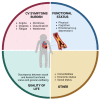Management of Coronary Artery Disease in Older Adults: Recent Advances and Gaps in Evidence
- PMID: 37629275
- PMCID: PMC10455820
- DOI: 10.3390/jcm12165233
Management of Coronary Artery Disease in Older Adults: Recent Advances and Gaps in Evidence
Abstract
Coronary artery disease (CAD) is highly prevalent in older adults, yet its management remains challenging. Treatment choices are made complex by the frailty burden of older patients, a high prevalence of comorbidities and body composition abnormalities (e.g., sarcopenia), the complexity of coronary anatomy, and the frequent presence of multivessel disease, as well as the coexistence of major ischemic and bleeding risk factors. Recent randomized clinical trials and epidemiological studies have provided new data on optimal management of complex patients with CAD. However, frail older adults are still underrepresented in the literature. This narrative review aims to highlight the importance of assessing frailty as an aid to guide therapeutic decision-making and tailor CAD management to the specific needs of older adults, taking into account age-related pharmacokinetic and pharmacodynamic changes, polypharmacy, and potential drug interactions. We also discuss gaps in the evidence and offer perspectives on how best in the future to optimize the global strategy of CAD management in older adults.
Keywords: aged; antithrombotic agents; coronary artery disease; frailty; hemorrhage; ischemia; multimorbidity.
Conflict of interest statement
Maciej Banach. is part of the speaker’s bureau of Amgen, Daichii Sankyo, Kogen, KRKA, Polpharma, Mylan/Viatris, Novartis, Novo-Nordisk, Sanofi-Aventis, Teva, and Zentiva; has consulted for Amgen, Daichii Sankyo, Esperion, NewAmsterdam, Novartis, Novo-Nordisk, Polfarmex, and Sanofi-Aventis; and has received grants from Amgen, Daichii Sankyo, Mylan/Viatris, and Sanofi. Olivier Hanon has received speaker fees from Novartis, Boehringer-Ingelheim, Bayer, BMS, Pfizer, AstraZeneca, Servier, Vifor, Leo pharma, and Sanofi Aventis. Giuseppe Biondi-Zoccai has consulted for Amarin, Balmed, Cardionovum, Crannmedical, En-docore Lab, Eukon, Guidotti, Innovheart, Meditrial, Microport, Opsens Medical, Terumo, and Translumina, all outside of the present work. Pierre Sabouret has received speaker fees from AstraZeneca, Amgen, Axis TV, BMS, Les laboratoires Servier, Novartis, Novonordisk, Sanofi, and Vifor, outside the present work. Emanuele Marzetti has received speaker fees from Abbot, Difass International, Nestlè, and Nutricia, and consulting fees from Cepton Strategies and Pfizer, all outside of the present work. All other authors report no conflict of interest.
Figures



References
-
- Cacciatore S., Martone A.M., Landi F., Tosato M. Acute Coronary Syndrome in Older Adults: An Update from the 2022 Scientific Statement by the American Heart Association. Heart Vessel. Transplant. 2023;7:7–10. doi: 10.24969/hvt.2023.367. - DOI
-
- Hofman C.S., Makai P., Boter H., Buurman B.M., de Craen A.J., Olde Rikkert M.G., Donders R.A., Melis R.J. Establishing a composite endpoint for measuring the effectiveness of geriatric interventions based on older persons’ and informal caregivers’ preference weights: A vignette study. BMC Geriatr. 2014;14:51. doi: 10.1186/1471-2318-14-51. - DOI - PMC - PubMed
Publication types
Grants and funding
LinkOut - more resources
Full Text Sources
Medical
Miscellaneous

